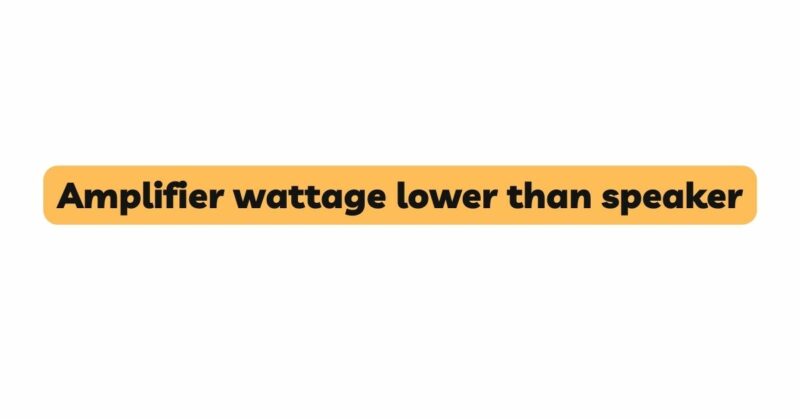In the ever-evolving landscape of audio technology, the synergy between amplifiers and speakers is a fundamental cornerstone of sound reproduction. However, a perplexing question often arises: What happens when an amplifier’s wattage falls short of a speaker’s power rating? This scenario seems counterintuitive, yet it is a topic worthy of exploration. This article delves into the intricacies of amplifier-speaker relationships, examining the potential implications and offering insights into whether an amplifier with lower wattage than a speaker’s power rating can still deliver an enjoyable listening experience.
Understanding Speaker Power Handling
Speaker power handling, typically indicated in watts, refers to the amount of electrical power a speaker can handle without damage. It is essential to consider this rating to prevent overloading and potential speaker damage during playback. Exceeding a speaker’s power handling capacity can lead to distortion, clipping, or even permanent damage to the speaker’s components.
Importance of Amplifier-Speaker Matching
The practice of matching amplifier power to speaker power handling capacity is grounded in maintaining optimal performance and ensuring the longevity of both components. Amplifiers are selected to deliver an appropriate amount of power that aligns with the speakers’ capabilities. In the ideal scenario, the amplifier wattage should be close to, but not exceed, the speaker’s power rating.
Challenging the Notion: Lower Amplifier Wattage
While it is conventional wisdom to match or slightly exceed the speaker’s power handling capacity, the question arises: Can an amplifier with lower wattage still drive a speaker effectively and deliver a satisfying listening experience? To answer this question, we need to explore the role of amplifier power, speaker efficiency, listening conditions, and the complex interplay between these factors.
- Speaker Efficiency: Making Every Watt Count
Speaker efficiency plays a pivotal role in the scenario of lower amplifier wattage. Speaker efficiency is measured in decibels (dB) and indicates how much sound a speaker can produce with a given amount of power. Speakers with higher efficiency can produce higher sound levels with less power. In cases where an amplifier’s wattage falls short of a speaker’s power rating, speakers with higher efficiency have a better chance of producing satisfactory sound levels without straining the amplifier.
- Listening Conditions: Room Dynamics Matter
The listening environment and room acoustics significantly influence the perceived sound quality and loudness. A smaller room with favorable acoustics may require less amplifier power to achieve desired volume levels. In such cases, an amplifier with lower wattage might still provide ample sound levels for an engaging auditory experience.
- Music Genre and Listening Preferences
The type of music and personal listening preferences also play a role. Genres with softer dynamics and lower sound levels may not necessitate high amplifier power. Additionally, if you tend to listen at lower volume levels, an amplifier with lower wattage might suffice without compromising sound quality.
- Headroom and Distortion
Headroom, the space between an amplifier’s maximum power output and the power required for normal listening levels, is essential to prevent distortion during dynamic musical passages. An amplifier with lower wattage might struggle to handle sudden peaks in audio signals, leading to distortion. However, if the amplifier can deliver clean sound within its power limits, it can still provide an enjoyable listening experience.
- Speaker Protection and Caution
Using an amplifier with lower wattage than a speaker’s power rating requires caution. The potential for damaging the speaker through excessive power input remains a concern. Utilizing speaker protection mechanisms and exercising care during playback can mitigate this risk.
Conclusion
The notion of using an amplifier with lower wattage than a speaker’s power rating challenges conventional wisdom but is not inherently flawed. The viability of this approach hinges on various factors, including speaker efficiency, room dynamics, listening habits, and the specific characteristics of the equipment in use.
While it is generally recommended to match amplifier power with speaker power handling capacity, situations may arise where lower amplifier wattage can still deliver an enjoyable listening experience, particularly with efficient speakers and in specific listening environments. However, caution is advised to prevent potential damage to speakers and to ensure that the amplifier can handle dynamic peaks without introducing distortion.
As technology advances and audio enthusiasts continue to explore the boundaries of auditory perfection, the relationship between amplifier wattage and speaker power handling remains an intriguing area of exploration. The pursuit of sonic excellence is a journey that encompasses innovation, experimentation, and a deep appreciation for the delicate interplay between technology and human emotion.


